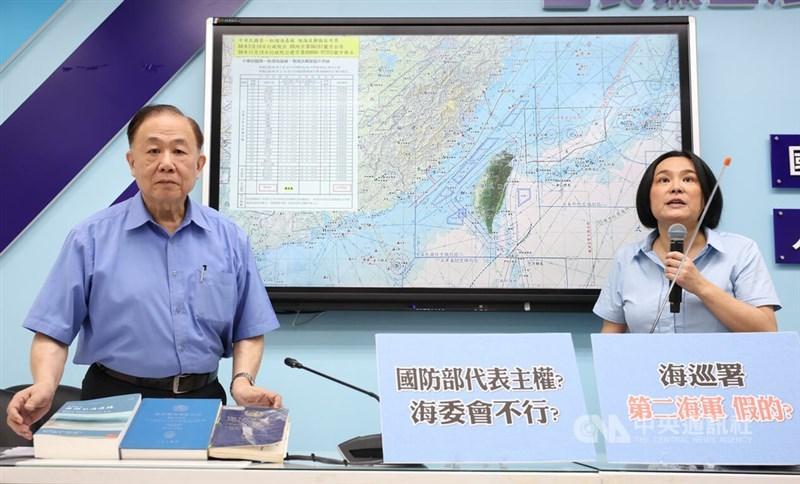The Chinese Nationalist Party’s (KMT) proposal to transfer authority over restricted and prohibited waters near islands close to China from the Ministry of National Defense to the Ocean Affairs Council would risk redefining conflict in the Taiwan Strait as “civil war,” the Democratic Progressive Party (DPP) said yesterday.
KMT Legislator Chen Yeong-kang (陳永康) told a news conference held by the KMT legislative caucus that the proposal is intended to reduce cross-strait conflict and does not involve any concession of sovereignty.
The amendment to the Act Governing Relations Between the People of the Taiwan Area and the Mainland Area (臺灣地區與大陸地區人民關係條例) — which would affect outlying Kinmen and Lienchiang (Matsu) counties — would allow enforcement by the Coast Guard Administration, which is supervised by the council, rather than the military, Chen said.

Photo: CNA
The ministry and council have formally expressed their opposition to the amendment.
Military vessels do not normally operate in restricted waters during peacetime, and only open fire during wartime when unidentified objects enter an area without prior notification, Chen said.
Chen cited an incident on Feb. 14 last year, in which an unregistered Chinese vessel capsized near Kinmen County, saying that the capsizing was caused by law enforcement actions rather than military activity.
Even if law enforcement vessels from China and Taiwan collide or exchange water cannon fire, it does not meet the conditions for an armed conflict — unless a military vessel becomes involved, he said.
The proposal aims to reduce conflict by allowing coast guard personnel from both sides to communicate directly, Chen said.
DPP caucus chief executive Rosalia Wu (吳思瑤) and DPP lawmaker Chen Pei-yu (陳培瑜) told a separate news conference that the proposal would "internalize Taiwan's territorial waters," redefine conflict between Taiwan and China in the Taiwan Strait as "civil war" and create "a vacuum in international support."
They also criticized KMT-backed amendments to the Offshore Islands Development Act (離島建設條例), saying they would help China circumvent country-of-origin labeling requirements and "open a national security back door."

The manufacture of the remaining 28 M1A2T Abrams tanks Taiwan purchased from the US has recently been completed, and they are expected to be delivered within the next one to two months, a source said yesterday. The Ministry of National Defense is arranging cargo ships to transport the tanks to Taiwan as soon as possible, said the source, who is familiar with the matter. The estimated arrival time ranges from late this month to early next month, the source said. The 28 Abrams tanks make up the third and final batch of a total of 108 tanks, valued at about NT$40.5 billion

Two Taiwanese prosecutors were questioned by Chinese security personnel at their hotel during a trip to China’s Henan Province this month, the Mainland Affairs Council (MAC) said yesterday. The officers had personal information on the prosecutors, including “when they were assigned to their posts, their work locations and job titles,” MAC Deputy Minister and spokesman Liang Wen-chieh (梁文傑) said. On top of asking about their agencies and positions, the officers also questioned the prosecutors about the Cross-Strait Joint Crime-Fighting and Judicial Mutual Assistance Agreement, a pact that serves as the framework for Taiwan-China cooperation on combating crime and providing judicial assistance, Liang

A group from the Taiwanese Designers in Australia association yesterday represented Taiwan at the Midsumma Pride March in Melbourne. The march, held in the St. Kilda suburb, is the city’s largest LGBTQIA+ parade and the flagship event of the annual Midsumma Festival. It attracted more than 45,000 spectators who supported the 400 groups and 10,000 marchers that participated this year, the association said. Taiwanese Designers said they organized a team to march for Taiwan this year, joining politicians, government agencies, professionals and community organizations in showing support for LGBTQIA+ people and diverse communities. As the first country in Asia to legalize same-sex

MOTIVES QUESTIONED The PLA considers Xi’s policies toward Taiwan to be driven by personal considerations rather than military assessment, the Epoch Times reports Chinese President Xi Jinping’s (習近平) latest purge of the Chinese People’s Liberation Army (PLA) leadership might have been prompted by the military’s opposition to plans of invading Taiwan, the Epoch Times said. The Chinese military opposes waging war against Taiwan by a large consensus, putting it at odds with Xi’s vision, the Falun Gong-affiliated daily said in a report on Thursday, citing anonymous sources with insight into the PLA’s inner workings. The opposition is not the opinion of a few generals, but a widely shared view among the PLA cadre, the Epoch Times cited them as saying. “Chinese forces know full well that